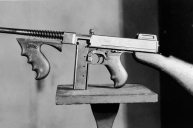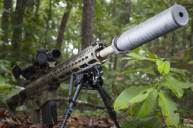With the backing of the gun industry, a group of Republican senators once again filed the Silencers Helping Us Save Hearing Act, or SHUSH Act, to eliminate the "excessive regulation of firearm suppressors."
In Monday's announcement, the bill's sponsor, Sen. Mike Lee, described the device as a "safety" accessory and its regulation as "antiquated federal controls." He added: "This bill is about making it easier for responsible gun owners to protect their hearing and safety while enjoying their Second Amendment right."
According to the announcement, Lee along with three other senators filed the bill to work with the Hearing Protection Act, a House measure that's been circulating through Congress to also deregulate silencers.
If passed, the SHUSH Act would remove all federal and state regulations of silencers, permit law enforcement to conceal silencers, remove minimum sentencing for some cases of illegal possession, and exempt them from regulation by the Consumer Product Safety Commission.
Along with comments from the senator from Utah, the announcement contains statements from three gun rights groups, including the National Association for Gun Rights, Gun Owners of America, and the National Shooting Sports of America.
In each statement, a representative describes silencers as a safety accessory because it dampens or obscures the sound of a gunshot. They also argue that making the item more accessible restores Second Amendment rights lost through the regulatory process.
"Senator Mike Lee, with the SHUSH Act, demonstrates a strong commitment to Second Amendment rights and leadership in cutting unnecessary government regulations for a firearm safety device," said Lawrence Keane, the senior vice president and general counsel for the NSSF. He added that silencers are "increasingly popular and legal to possess in 42 states and legal for hunting in 41 states."
The regulation of silencers
Congress opted to regulate silencers, also called suppressors, with the National Firearms Act of 1934 in response to Prohibition-era violence. Under that federal law, if you want a silencer, machine gun, short-barreled long gun, or item deemed any other weapon, you must first pay a $200 tax and complete a series of checks.
Although critics of silencer regulation point to the popularity of silencers today as well as the few instances they're used in crimes, supporters argue that the low crime rates are proof that the regulations work. Before 1934, there were multiple reports of criminals using silencers to commit horrific acts of violence, which resulted in the inventor of the device to stop making them because of the belief that they aid in crime.




